After a steady increase in unemployment since June 2022, the job market in the Czech Republic has finally fallen.
Unemployment rate in the Czech republic has increased every month since June 2022, but the end of winter marks a shift in these trends.
Projections for the unemployment rate in the Czech republic exceeded expectations this spring. Hovering at 3.9 percent during February, the unemployment rate fell to 3.7 percent by March – exceeding predictions that it would only decline to 3.8 percent.
Experts attribute the rapid decline of unemployment to favourable weather conditions, which allowed for the resumption of work in the industrial sectors, such as agriculture, construction, forestry, and mining.
Regardless, the unemployment rate in March 2023 was 0.3 percent higher than last March, although it remains the lowest among EU member nations. January 2023 marked the first month in a 5 year period where there were fewer job vacancies than reported job applicants.
By February, the pressure of the job market eased, although the number of job vacancies exceeded the number of applicants by less than 600.
This trend continued to accelerate in March, with the surplus of job vacancies reaching 10,000. Despite unemployment continuing to fall and the job market stabilising itself, the surplus of job vacancies remains substantially lower than previous years.
In March 2022, there was a surplus of 150,000 job vacancies.
Attributed to an increased demand for outdoor labour, the unemployment rate is projected to fall to 3.5 percent during the summer, but it remains a worry that the unemployment rate will steadily rise again once the warmer months come to an end.
Seasonal work is far from the only factor which determines the unemployment rate in the Czech Republic. In an effort to mitigate the pressures from soaring energy costs and inflation, people worry that businesses will start looking towards layoffs.
This is most evident in government sectors: as of July 1st, 2,269 positions will be eliminated from the Czech Post (Česká pošta).
Construction Company, Metroslav, has begun large-scale renovations on Prague Department store, OD Máj.
Given its status as a cultural moment, many elements from the original building will be preserved – a decision made in agreement with preservationists.
“We would like to open Máj to the public in a modernised form in the first half of 2024. The total costs after the completion of the complete reconstruction will reach four billion crowns,” said developer Václav Klán, who manages Amadeus Real Estate.
Chief Architect of the renovations, Milan Mlady, believes the project will reinvigorate the area as a cultural and entertainment centre.
Metroslav is making efforts to maintain and preserve the original appearance of the monument. During their planning phase, they collaborated with the original architects, Martin Rajniš and John Eisler, and additionally consulted both urban planning and historic preservation groups.
“Even after the reconstruction, the house will look like it is the original house, it will just have a full-fledged new cladding, except for the facades, which are distinctive,” said Mlady.
The building – standing on the site of the Neo-Gothic Šlik Palace – was originally completed in April 1975, and declared a cultural monument by the Ministry of Culture in 2006.
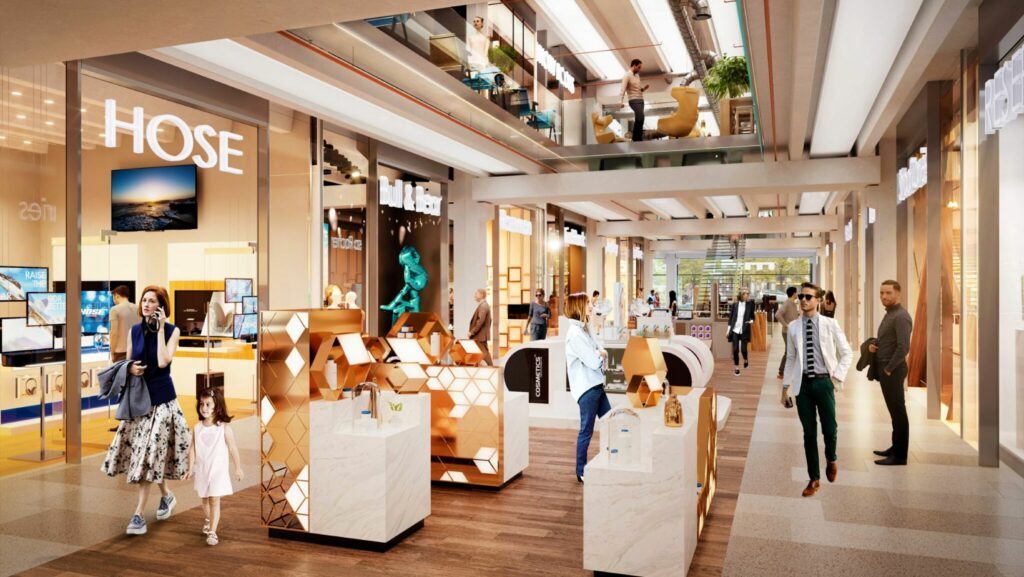
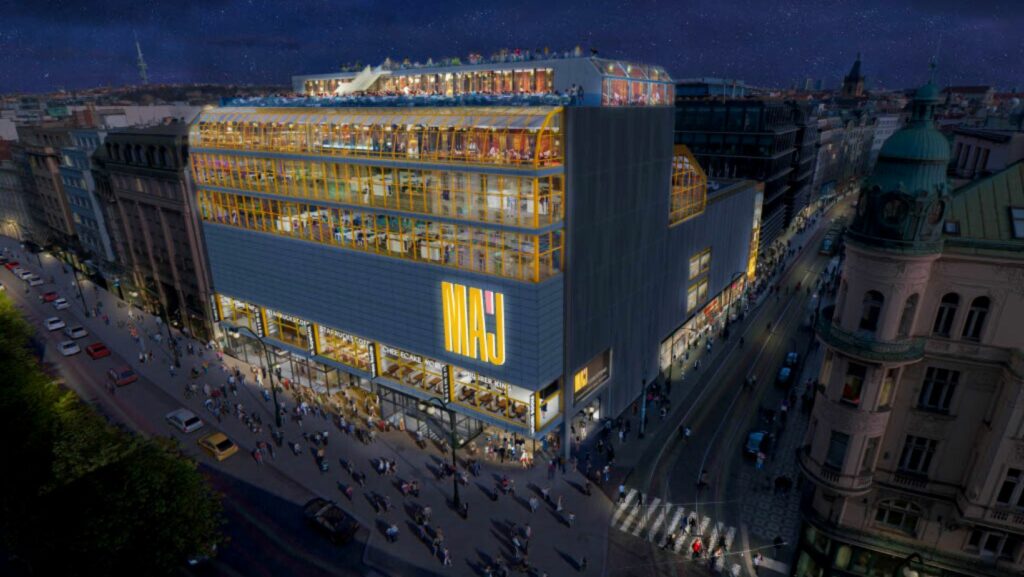
New statistics reveal the influx of self-employed Ukrainians and Russians within the Czech Republic over the course of 2022 and 2023.
Between 2019 and 2021, 207 Ukrainian entrepreneurs registered a new business per month, while in 2022, the average grew to 710 per month. A similar trend is apparent with Russian entrepreneurs as well, with 63 businesses registered each month in 2022 – an increase from the 51 per month before the Russian invasion of Ukraine.
These trends were reflected in recent analysis by the Czech Credit Bureau (CRIF). “The largest number of Ukrainians started business here from last August to November, when more than a thousand entrepreneurs of Ukrainian nationality started their activities every month.
In some months, this was as much as 18 percent of the total number of new entrepreneurs in the Czech Republic. For January and February this year, the monthly average is already lower, i.e. 708, which is still a lot compared to the years before the war,” said Věra Kameníčková, CRIF analyst.
Since March 2022, 15% of new businesses registered were in the manufacturing and construction industries, with nearly a third of these businesses founded and operated by Ukrainian entrepreneurs.
Russian entrepreneurs on the other hand showed a different pattern, with 23% registering businesses in administrative and technical fields, and 14% registering business in the Information and communications field – predominantly as consulting firms.
As revealed by the CRIF analysis, Prague was home to the greatest number of newly registered businesses, hosting 21% of all new businesses registered in the previous year. For Ukrainian and Russian entrepreneurs, these numbers were 35% and 69%, respectively.
After Prague, the Central Bohemian region saw the second highest entrepreneurial growth, with 13% of all businesses registered in the previous year – according to CRIF.
For self-employed Ukrainian and Russian entrepreneurs, it was 14% and 9%, respectively
Although hydrogen powered cars are readily accessible in the Czech Republic, fuelling stations are far less prevalent.
With the completion of Prague’s first hydrogen car fuel station, this is slowly starting to change.
Over the course of the past several years, there has been a significant influx in the interest in hydrogen fuel cells, with automobile manufacturers starting to invest in this technology for both commercial and domestic usage.
Currently, three models of hydrogen cars are available in the domestic market, manufactured by Toyota and Hyundai.
Without further investment in more fuel stations, the growth of the market for hydrogen cars will be stunted in the Czech Republic. This problem has been addressed by the completion of the first publicly available hydrogen station with 24/7 operation in Barrandov.
The hydrogen fuelling station is owned and operated by Orlen Unipetrol, a Czech chemical company owned by Polish oil company PKN Orlend. Currently, the cost for fuelling sits at CZK 278 per kilogram – which can power a hydrogen car for 100 kilometres.
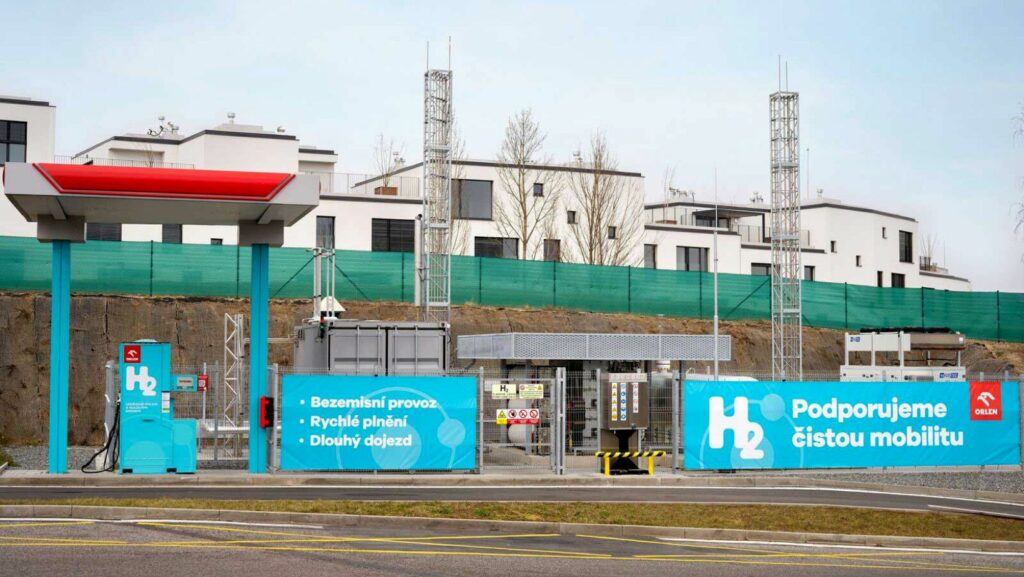
Director of Toyota and Lexus in the Czech Republic, Martin Peleška, believes that hydrogen cars could be adopted for use in fleets, Additionally, he maintains that the development of hydrogen fuelling infrastructure will accelerate in the near future, with the Unipetrol company estimating the construction of 28 hydrogen refuelling stations by 2030.
Transport Minister, Martin Kupka, has hopes that domestic hydrogen infrastructure will eclipse the estimates provided by Peleška, with 12 hydrogen fuel stations being completed by 2025, and 80 stations by 2030.
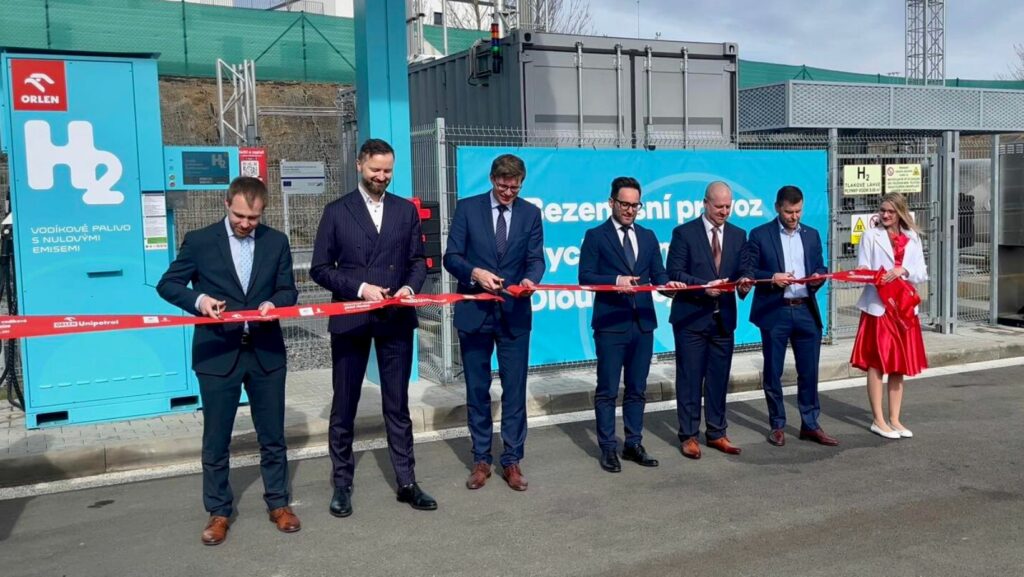
The Czech government has allocated six billion crowns for such infrastructure, with 11 hydrogen fuel stations already entering the approval phase. This will be necessary to meet the demands of the estimated 50,000 hydrogen cars that will be registered in the Czech Republic by 2030.
The site formerly occupied by the Smíchov Distillery will soon be undergoing an extensive transformation.
By 2026, a revitalization project inspired by London’s Kings Cross will be completed on the site of the former Smíchov distillery, situated between Nádražní and Strakonická streets, which has remained vacant since 2001.
The investor, the Trigema group, has introduced a three-stage plan for their development, including the construction of residential buildings, school facilities, and a food and entertainment district.
The project’s aesthetics plan to integrate the area’s industrial past, displaying the previous architecture – brick facades and original chimneys – alongside modern design.
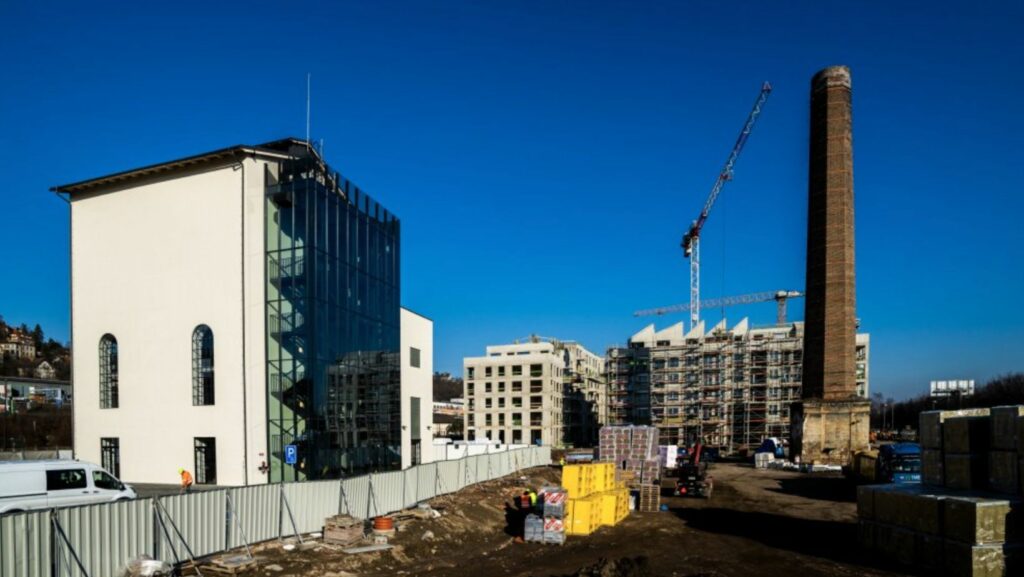
Brownfield, which will offer over 500 new flats after the revitalization, is located between Nádražní and Strakonická streets.
Currently, both buildings are under monument protection. Work by David Černý, the famous Czech artist, will be displayed in a gallery located in the former brewery, alongside a cafe and terrace.
Artefacts from the area’s industrial past will be displayed throughout the area, Petra Martínková, spokesperson for Trigema explained. “The complete reconstruction required not only repairs to the interior of the building, including new plastering, ceilings, and staircases, but also the rehabilitation of the load-bearing structures.”
The architecture for the development was primarily inspired by London’s King Cross station. “We really enjoy industrial London, and it was part of the project brief,” explained Trigema founder, Marcel Soural.
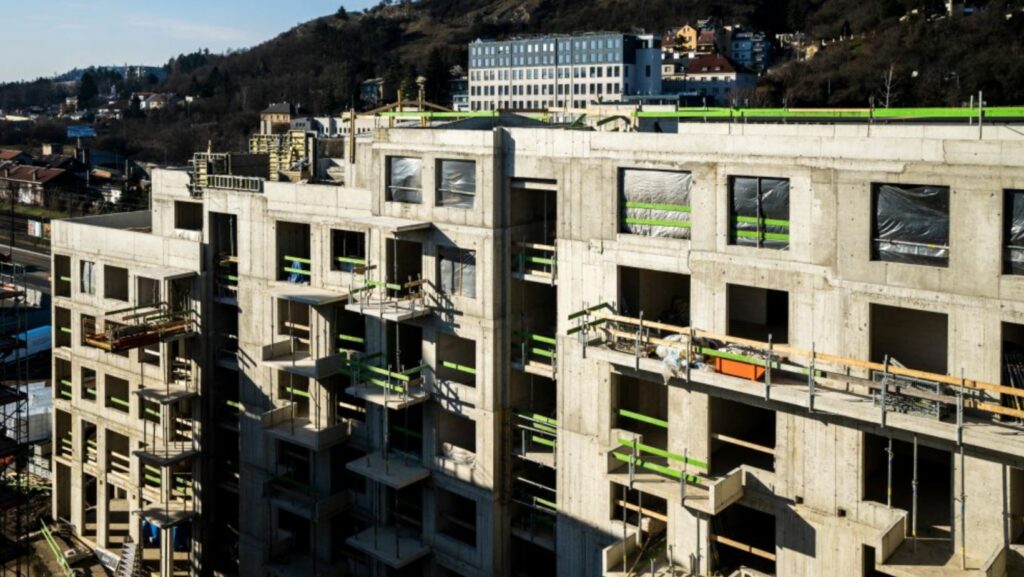
Initial estimates predict the project to cost 4 billion crowns, reaching completion in 2026. The project’s first phase has been recently completed.
Trigema is far from the only development company investing in Smíchov. Sekyra Group has started construction on Smíchov City – a mixed residential commercial district located near Knížecí.
The train station also has plans for a complete renovation, called Terminal Smíchov.
As of March 2, Prague Castle’s South Gardens are open to the public after its closure during winter.
Accessible year-round, the visiting hours of the Royal Garden have been extended and is now open from 10:00 a.m to 6:00 p.m.
Further adjustments to the grounds include modifying existing tickets and lowering entrance fees. The Prague Castle Administration (SPH) is hoping to focus on domestic visitors; introducing new tours which visit places inside of the grounds that are typically off-limits for tourists.
Although entry to the Prague Castle grounds remains restricted by security checkpoints, visitors to the Royal Garden and Deer’s Moat will be able to circumvent these checkpoints. Like the Royal Garden, both parts of Jelení kopóp have been open year-round since last year.
Depending on good weather, the access footbridges from Klárov and from Jeléní street will be open as well, and the Deer Moat will be open daily from 10:00 a.m to dusk.
During the months of March and April, the Royal Garden will be open from 10:00 a.m. to 6:00 p.m. During May and June, it will be open until 7:00 p.m., and in July and August, it will not close until 8:00 p.m. The hours will return to normal in September.

As stated on its website, higher operating costs, compounded by inflation, is forcing the Prague Castle Administration to seek additional sources of income.
The basic ticket, which grants access to the Old Royal Palace, the Basilica of St. George, and Zlatá ulička, will remain the same – costing CZK 250. A new ticket package is available for 200 CZK which grants visitors access to both the exhibition, ‘The Story of Prague Castle’, and the newly reopened Picture Gallery.
According to SPH, this arrangement is favourable for tourists, as previously, tickets for these two exhibits would’ve had to be purchased separately for 150 CZK each.
Visitors over the age of 70 will have free entry to the Prague Castle grounds, granting access to the Cathedral, the Old Royal Palace, the Basilica of St. George, Golden lane, the newly opened Prague Castle Picture Gallery, and the permanent exhibition, ‘The Story of Prague Castle’.
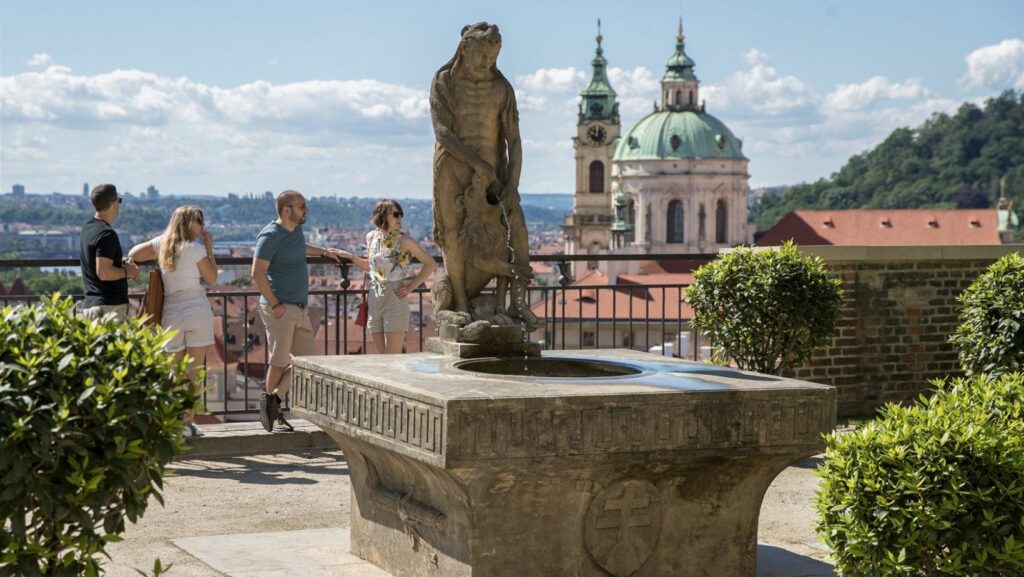
SPH also introduced new guided tours that allow tourists to visit the chapel of St. Wenceslas – which is typically inaccessible to the public – as well as descend into the royal tomb.
Private tours are additionally provided by SPH, offering the opportunity to visit the cathedral, Old Royal Palace, and Golden Alley without the public present.
These private tours will cost CZK 1000 per person, or CZK 10,000 for a large group.
Finally, SPH provides curated tours of the inner triforium of the Cathedral, although advance booking is required.
On February 25, 2018, Milion chvilek pro demokracii (lit. ‘A Million Moments for Democracy’) was conceived as a petition for Andrej Babiš’ resignation from parliament, arguing that someone under criminal investigation should not be allowed to hold the position of Prime Minister.
Although they fell short of their goal for one million signatures, the organization has continued to maintain a strong civic presence within the Czech
republic, urging for greater accountability in government and greater civic participation.
They are predominantly funded through private donations and fundraisers.
We met Hana Strašáková, spokesperson for Milion chvilek pro demokracii.
“Over the five years of our activity, we have gathered know-how on how to talk to those who do not vote for democratic political parties and who do not agree with Million of Moments. … Our goal will undoubtedly be to unite all the people who care about the future of our country. And that will undoubtedly require a greater focus on non-urban citizens.”
Earlier this year, Petr Pavel was elected President of the Czech Republic after two rounds of voting,receiving 35.40% of votes in the first round and 58.31% in the second. Prior to being elected President, Petr Pavel served as the Chairman of the NATO Military Committee.
“[Million Moments for Democracy] will monitor Petr Pavel and his activities in the same way as his predecessor. However, it is certain that the election of Petr Pavel is a big change in the political culture and the certainty of maintaining the course towards the west,” said Strašáková.

Hana Strašáková
“We can now look at him as a partner with whom we can walk the path of uniting society and nurturing democracy. We perceive him as a president who “is normal”. It may sound like a banality, but believe me, after ex-president Miloš Zeman, the label “normal” is a great compliment.”
Looking towards the future, Strašáková outlined what Million Moments for Democracy wishes to see from Pavel’s presidency. “[Million moments is hoping] that he will support the values of Western democratic society and that he will stay within the limits of his powers, within the limits of the law.”
The war in Ukraine
Since Russia invaded Ukraine on February 24, 2022, over 5 million Ukrainians have been displaced – crossing borders into neighbouring countries – and an estimated 475,000 Ukrainian refugees have been welcomed into the Czech Republic.
To date, they have organized several events to bring about awareness of – and display solidarity with – the people of Ukraine.
“Since the beginning of the war, we have been calling for support for organizations that care for refugees or work directly on the territory of Ukraine.
We organized several events in support of Ukraine, which were attended by a hundred thousand people, to call on Czech citizens to persistently help Ukraine, but also to support and unite Ukrainians who fled to us before the war. We connect non-profit organizations, personalities and celebrities to
make aid to Ukraine as effective as possible. We also teamed up with cities across Europe and together did an event at the same time, which was joined by the President of Ukraine, Volodymyr Zelenskyi.”
When asked about their plans to provide assistance to Ukrainians, both domestic and abroad, Million Moments for Democracy discussed the importance of monitoring the government to ensure the funding allocated to Ukrainian aid will remain effective.

“Our big task is also to help society deal with the effects of war, such as energy or economic crises. [We] watch over the government of the Czech Republic so that aid to Ukraine does not become just a cover for it to make bad decisions that do not benefit the people or the future economy in the Czech Republic.” Strašáková commented.
Protests set up by pro-Russian right-wing parties occurred in Prague on September 28, 2022, and had tens of thousands of people in attendance. Right-wing voters were not the only ones to patronise this event, but rather a selection of individuals from across the entire political spectrum.
“We spread verified information and tried to prevent people from being paralyzed by fear. We organized a large Czech campaign against fear, which was supposed to reassure our citizens that we can handle the winter and to support them in helping Ukraine”
In her final comment on the topic, Strašáková stressed the need to keep the conversation about Ukraine in the forefront of the public zeitgeist. “Our task is to spread the word about the need to support Ukraine because it is now the living shield of Europe. There is also a need to reduce pro-Russian and hateful sentiments towards Ukrainian refugees. To calm the frightened. And to explain what it means to be in solidarity.”
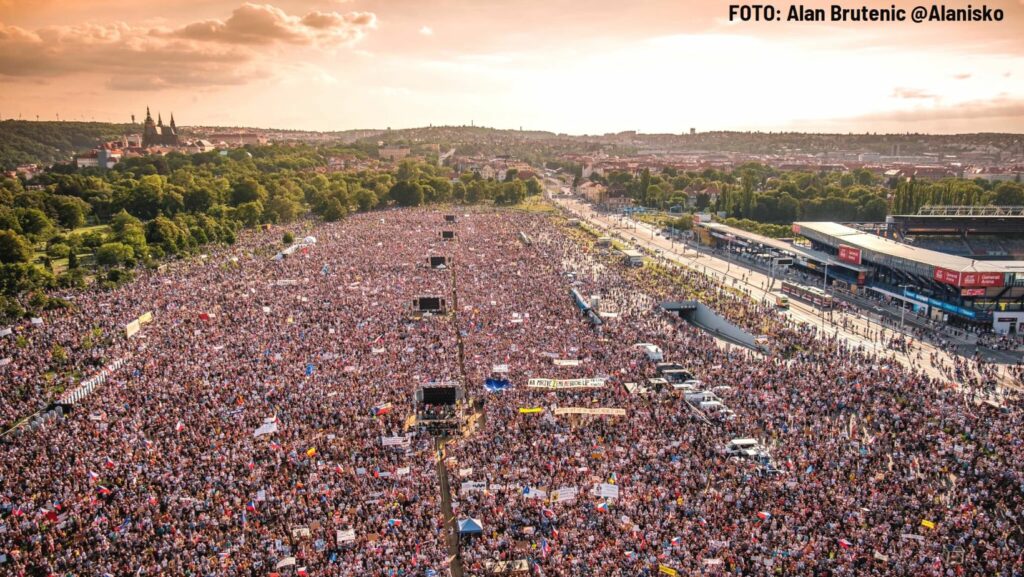
On February 25th, Million Moments for Democracy celebrated its 5-year anniversary. “In five years, the mood and situation in society has changed. We have passed through unprecedented crises and many challenges still await us. Society is fragmented by existential fear and a heated election
campaign. Many people wished for a different election result. It is therefore important now to find a common language among ourselves – with voters of all candidates, with non-voters and with seekers. Petr Pavel said in his statements that he would be the president of all. We must therefore now see to it that they fulfill their promises.”
In a final comment, she outlined how the organization will move forward, and how they plan to assist the ever-changing political landscape in the Czech Republic.
“Our task will be to unite everyone who is not indifferent to what country they live in and what they will leave behind for future generations. We must not slack off in helping the needy, people on the margins of society and the people around us. If we have at least a little to give, let’s give. The image of
the future of our country needs to be composed with all fellow citizens. And I also believe that it will finally be possible to get Andrej Babiš into political retirement and limit the populist and extremist parties in the Chamber of Deputies.”
February 22, Kunsthalle
This week, the Kunsthalle exhibition space celebrates one year since its opening and will be hosting several events to commemorate this occasion. Ranging from tours and music to workshops and exhibitions, events will be held from February 22 to March 1. Admission will be free on Wednesday and CZK 260 on the following days.
Their regular exhibitions are still operating during this time, and you can visit the space to see Marketa Magidova’s work, My Sweet Indelible Planet. Visitors can also look forward to a photo series documenting life in late 20th-century Bohemia – taking place later in March.
February 23, The invisible exhibition
The invisible exhibition brings a unique interactive exhibition concept. You will move into completely dark rooms, where you will also become blind for a while. The illuminated part of the exhibition contains a number of interesting games and tools from everyday life.
The language of the tours is Czech by default, if you wish to have a tour in another language, please contact the organizers. Tickets from CZK 280.
February 24, Lucerna Music Bar
American post-punk band, Algiers, will be performing at Lucerna Music Bar on February 24. Along with new music, they will perform songs from their previous albums, There Is No Year, and The Underside of Power. If fans were unable to see their performance at the Pop Messe festival last summer, they will now be able to see them headline their own show.
Doors will open at 18:00, tickets are selling for CZK 574.
February 25, Cross Club
This weekend, Cross Club will be hosting a charity event set up by the activist group, No Borders Team. Vegan burgers will be served from 14:00 until 23:30 on Saturday, and all proceeds will help fund humanitarian aid projects, such as assisting people fleeing the war in Ukraine, as well as refugees stranded on the Polish-Belarusian border.
“All voluntary solidarity contributions for the burgers will, after deducting the costs, be passed on to help people who are fleeing the war. No Borders Team (NBT) is an anarchist grassroots group uniting individuals from various collectives from Poland and Europe who oppose the actions of border authorities whose aggression is directed against people seeking refuge. As a group, NBT believes that freedom of movement and residence is a basic human right. Therefore, they do not agree with the authorities’ policy of categorizing people. No Borders Team helps everyone fleeing war, both from Ukraine and on the Polish-Belarusian border,” the organizers say.
A new policy aimed at the mitigation of light pollution will be introduced later this year.
The Czech Republic will introduce new light pollution legislation in March 2023. These policies will apply to newly-built public and private infrastructure and will outline the maximum and minimum lumens for light sources.
Outlined in the EU’s official publication on the matter, these new measures were “composed based on desktop research by a team at the Ministry of Environment of the Czech Republic”, and were designed to be in accordance with the EU’s Light Pollution Reduction Measures in Europe, which were set forth during the Czech Republic’s presidency of the EU.
These regulations will take effect in March 2023, and all new private and public construction projects will be obliged to conform to the maximum and minimum brightnesses set out in the law. Not retroactively enforced, all current and existing infrastructure will be exempt.
This isn’t the first time the Czech government has introduced legislation with the goal of mitigating light pollution. 2002 saw the enactment of the ‘Dark Sky Law’, which was one of the first laws in Europe that recognized this issue. I
t was included in an Act which regulated air pollution but was never fully realized – and eventually entirely removed during subsequent amendments to the Act.
In 2017, the Czech Republic once again attempted to reduce light pollution: a committee led by the Ministry of Environment began more intensive research into the problems of – and potential solutions to – this type of pollution.
This research was used to draft a law that focused on preventing light pollution in National Parks. On October 26th, 2022, Brno hosted the Light Pollution 2022 Workshop, which saw many European governments and businesses collaborating in an effort to reduce light pollution through the creation of more stringent European standards.
The Brno Appeal to Reduce Light Pollution in Europe was the culmination of the conference; a document that outlined several themes and goals participants pledged to pursue. According to the document, these include “acknowledging the scientific evidence on effects of light on living organisms during the night, … and stressing that light knows no borders as a light source can easily affect vast areas, which justifies the need for states to act in a coordinated manner”.
The Brno Appeal to Reduce Light Pollution in Europe also set forth more concrete and actionable goals, such as the rules for correct lighting.
”Only illuminate where and when necessary for public needs or work tasks … and do not direct the light towards the upper hemisphere or towards vulnerable habitats”, the document reads. This pledge underlined and informed the new legislation which deals with light pollution in the Czech Republic.
